Ayatollah Khamenei in a meeting with scientific elites:
supporting knowledge-based companies, and getting them involved in the country’s main sectors and plans
supporting knowledge-based companies, and getting them involved in the country’s main sectors and plans

Leader of the Islamic Revolution Ayatollah Seyyed Ali Khamenei, in a meeting with more than one thousand young elites and top scientific talents of the country on Wednesday, described the elite youths as precious gifts from God and a trust in the hands of officials. Emphasizing that he will not lose even a single moment in defending the country’s scientific community and elites, the Leader said, “By relying on the elites and pundits and through creating a young and perseverant generation, the great Iran will turn into an advanced, powerful, honored, and dignified country capable of raising the flag of the new Islamic civilization.”
The Leader of the Islamic Revolution described elites, especially the elite youths, as unique and precious gifts and divine trusts given to the Iranian nation and officials and added, “The [main] duty of [Iranian] officials vis-à-vis these valuable divine gifts is to protect them and make effort to identify and train more elites.” The Leader also emphasized that elites, for their part, are responsible with regard to this divine bounty and should thank it by feeling responsibility and taking advantage of their talent and ability in the correct way.
The Leader of the Islamic Revolution mentioned bolstering the society’s belief in the general notion “we can”, as the main reason behind his repeated emphasis on the need to appreciate the young elites and support them. Ayatollah Khamenei then pointed out, “Unfortunately, during the era of Qajar and Pahlavi [two monarchial dynasties of Iran], the profound belief in ‘inability’, ‘we cannot’, and ‘dependence’ had been instilled in [the Iranian] people and youths and they had been institutionalized in the society and finally, a great country full of human and material resources with [a glorious] history and ancient civilization had been defined under [the hegemony of] the West in a humiliating manner.”
Ayatollah Khamenei added, “Under such conditions, the Islamic Revolution of Iran managed to bring about a huge change [in the Iranian society] and, in fact, the revolution of self-belief and self-confidence went to war against dependence.”
The Leader mentioned eight years of the Sacred Defense [the Iraqi imposed war against Iran] as a clear and pride-inspiring arena of “self-belief and self-confidence,” and emphasized, “Although the war was a very bitter, damaging and difficult event, it proved to the Iranian youths that through trust in God and reliance on domestic talents and capabilities, one can overcome an enemy, who is supported by all big powers.”
Ayatollah Seyyed Ali Khamenei said, “Despite [the fact that] the Islamic Revolution revived the spirit of ‘we can’ as opposed to the spirit of ‘dependence’, and promoted self-belief in the society, the opposite side has been taking steps to reproduce the blight of the dependence culture in new and apparently attractive forms, because this is the nature of profound wars, which are called today the soft war.”
Mentioning the issue of “globalization” and the offer by Americans and Europeans to Iran to join the “global community,” as another clear example of efforts made to reproduce the culture of dependence, the Leader noted, “Opposition to joining what the Western side calls the global community is not tantamount to opposing [any form of] foreign communications, but means resistance in the face of the culture imposed by big powers on the economy, politics and security of the country.”
The Leader of the Islamic Revolution added that the main reason behind special and serious attention that Iranian officials pay to the issue of elites is the need to achieve the great goals that are ahead of the Islamic establishment and noted, “Elites are the driving force for achieving these great goals and officials must take a serious, practical, sympathetic and insistent approach to the issue of elites.”
Elsewhere in his speech, Ayatollah Khamenei elaborated on the great goals pursued by the Islamic establishment, saying, “The Islamic Republic of Iran must turn into an advanced, powerful, [and] honorable country endowed with new ideas, [and] with dignity, having the feeling of self-esteem, full of spirituality and faith and hoister of the flag of the new Islamic civilization. The requisite [condition] for achieving these lofty goals is to attach importance to elites and appreciate this great divine bounty.”
Focusing on calamities and problems that are nagging humanity today and the deadlock faced by materialistic schools of thought, Ayatollah Khamenei argued that the world needs to hear something new with regard to human and international issues, adding, “The [ongoing] election campaigns in America and issues raised by the two candidates constitute a clear and evident example of the consequences of lack of spirituality and faith among those in power.”
The Leader of the Islamic Revolution then pointed out, “During the coming weeks, one of these two candidates of America’s [presidential] election, whose remarks and condition you observe, will become the president of a country which has power and wealth and the biggest amount of nuclear weapons as well as the biggest media in the world.”
Ayatollah Khamenei continued his remarks by saying that to achieve its great goals, the Islamic establishment needs to create a brave, faithful, educated, innovative, pioneer, self-believing, zealous, vibrant, and motivated generation, adding, “This generation, which despite some false propaganda [claims] is a revolutionary generation in the real sense of the word, will dedicate all it has to the progress of Iran.”
The Leader of the Islamic Revolution described the role played by elites in shaping and motivating this young generation as very important and added, “Through their vibrant effort, elites can serve as a driving force and encourage the young generation, which is the main asset of the country, to work and make efforts.”
Ayatollah Khamenei pointed to his own frequent emphases since 15 years ago on the need to launch a scientific and software movement and said, “This movement was welcomed by elites, scholars and students and led to good results, but later faced [certain] obstacles, which must be identified and removed.”
The Leader of the Islamic Revolution mentioned obstructionist efforts by enemies as one of those obstacles and added, “Some people are upset as soon as the word ‘enemy’ is repeated, but this repetition and warning, like the repetition of the word ‘Satan’ in the Holy Quran, is aimed at creating constant vigilance and, in fact, is ‘recognition of conspiracy’, not ‘imagining conspiracy’.”
Ayatollah Khamenei mentioned stopping Irans scientific movement as another main goal for the country’s enemies and said, “If they fail in realizing this goal, they will make an effort to deviate it [from the correct path] and if it fails, they will try to defame and tarnish it. Therefore, everybody must be watchful not to help the realization of these goals [which are pursued by the enemies] through our naïve acts.”
The Leader noted that diverting research works and student theses from meeting the real needs of Iran was an example of the effort made to help divert the country’s scientific movement. Brining another example about defaming this movement, Ayatollah Khamenei said, “They invite a person to the country claiming he is a scientist and that person publishes a photo of [public] boards with ads about selling theses in Iran to defame the country’s young elites; are such people really scientists?”
The Leader of the Islamic Revolution cited information from creditable global scientific sites, adding, “The speed of scientific progress of Iran was thirteen times higher than the world’s average at a juncture and this speed must by no means be reduced, but must increase because we are afflicted with many [forms of] scientific backwardness.”
The Leader noted, “In the face of the reduced speed of the country’s scientific progress, some officials say Irans scientific ranking has not fallen, but let’s note that Irans scientific ranking was supposed to rise not merely be preserved.”
Ayatollah Khamenei asserted that any damage to the country’s scientific movement will cause desperation of elites and the young generation, adding, "This very heavy damage would not be compensated easily and rapidly and would cause [Irans] young elites to look to other countries.”
The Leader of the Islamic Revolution also mentioned the identification and hiring of young talents as one of the important duties of Iranian state organs, warning, “Before foreigners discover and attract these huge assets at scientific exhibitions inside the country or through other methods, you must identify and support these elite youths.”
The Leader of the Islamic Revolution then mentioned certain points, which can further energize the “blessed movement of science and technology” in Iran, noting that “supporting knowledge-based companies,” “quantitative development and qualitative upliftment of these companies,” and “getting them involved in the country’s main sectors and plans” were major necessities, which must receive serious attention.
The Leader then pointed to the important role of “promoting use of the products made by knowledge-based companies” in bolstering such companies, and while addressing state officials, said, “Ask state-run bodies to meet their needs through the products of knowledge-based companies.”
Calling for “serious attention to forming elites’ centers in universities” and urging Ministry of Education to “solve problems faced by the National Organization for Development of Exceptional Talents,” were two other points mentioned by Ayatollah Khamenei as being effective and useful for the strengthening of the country’s scientific movement.
The Leader of the Islamic Revolution then referred to the importance of the National Elites Foundation, and indicated his deep trust in the capabilities and good management of this foundation by Dr. [Sorena] Sattari, the vice president for science and technology. The Leader, however, added, “There are concerns about problems that exist between the vice presidency for science [and technology] and the [National] Elites Foundation and these problems must be solved through either separating these two [institutions], or appointing a powerful director for the foundation.”
Ayatollah Seyyed Ali Khamenei then expressed concern about reports on slowing down or stoppage of large-scale research projects in such important fields as aerospace, satellite and nuclear technologies, and some other fields, and emphasized, “Officials must pay full attention [to the fact] that such important projects must absolutely never be slowed down, mothballed or stopped, because through the scientific damage they cause, they would make young scientists desperate and this is a very grave danger.”
Expressing satisfaction about the establishment of a cultural department at the National Elites Foundation and while emphasizing the need to further promote activities of this department, the Leader opined that organizing jihadi excursions for the elites would be both important and useful.
The Leader of the Islamic Revolution then rounded up this part of his remarks by saying, “The main goal is to create a society and a country, which while being endowed with such global indices as ‘scientific progress and power and wealth’, be also inundated with ‘faith, spirituality, and honor’, and save the humanity from the current ignorance and misguidance by appealing to nations’ hearts. And without a doubt, the realization of this important goal will be possible for the great nation of Iran and the dear, intelligent, and highly-motivated youths of the country.”
Ayatollah Khamenei referred to hostility of satanic powers toward any move that is opposite to them, adding, “A few days ago, an American statesman said as long as Iran supports and takes sides with the resistance [axis in the region], it is not clear if sanctions [imposed on Tehran] would see a major change. This is the same reality about which I have frequently talked to officials.”
Referring to remarks made by some American officials in their meetings with their Iranian counterparts about “pessimism of the Leader of the Islamic Revolution toward America,” Ayatollah Khamenei asked, “Can one be optimistic toward you despite such remarks that you make?”
Ayatollah Khamenei then recalled the previous remarks he had conveyed to officials in private and public sessions, saying, “I have said time and again that if you retreat in the nuclear [case], then they will raise the issue of [Irans] missile [program]; if you further step back, they will raise the issue of [Irans] support for the resistance [axis]; if you continue to retreat [in the face of the Western countries’ demands], they will focus on the issue of human rights, [and] then, if you accept their norms, they will try to do away with religious norms in the [Iranian] government.”
Referring to a recent statement by the European Union, which had focused on huge potentialities and capacities of Iran, the Leader said, “What I say about potentialities for progress as well as human and natural resources of Iran is not ranting, but is a reality to which Western countries have owned up.”
The Leader of the Islamic Revolution emphasized, “Americans will certainly fight an ‘Iran with such a capacity for progress and endowed with a government based on Islam’, and understanding and analysis of this important point among young elites will help them play their historical role.”
In another part of his remarks, Ayatollah Khamenei described the event of Ashura as a sun that never sets and said, “The event of Ashura is a true image of the struggle between light and darkness and the fight between honor and meanness, and this [evolutionary] course was made complete by Hadhrat Zeinab (PBUH) and Hadhrat Imam Sajjad (PBUH).”
Thanking those organs, which manage Ashura mourning processions, the Leader of the Islamic Revolution said, “Generally speaking, the presence of multitudes of youths, speeches rich in content, [as well as] some highly-meaningful laments and mourning ceremonies had elevated the level of mourning processions.”
Before the remarks by the Leader of the Islamic Revolution, Dr. [Sorena] Sattari, vice president for science and technology and president of the National Elites Foundation, presented a report on the activities and plans of the National Elites Foundation, noting, “Human assets are the most important resources for any country and necessary infrastructure must be provided in order to take advantage of them.”
Also Messrs.:
- Dr. Alireza Babakhan, holder of a doctoral degree in science and technology policymaking and winner of the National Elites Foundation’s scholarship,
- Mojtaba Fayyazbakhsh, student of computer engineering and winner of the gold medal of the Student Olympiad in the field of computer,
- Dr. Amir Shamlou, holder of a doctoral degree in biotechnology and nanotechnology,
- Dr. Alireza Bazargan, holder of a doctoral degree in chemical engineering and a member of the National Elites Foundation,
- Dr. Seyyed Javad Kazemitabar, graduate of electrical engineering and communications from the University of California and holder of the silver medal of Irans Mathematical Olympiad,
And ladies:
- Ensiyeh Sadat Mansouri, medical student and holder of the bronze medal of the Student Olympiad,
- And Dr. Zahra Davarpanah, holder of a doctoral degree in Western philosophy and winner of the National Elites Foundation’s scholarship,
offered their viewpoints. During the meeting, representatives of elites stressed the following points:
- The need for the establishment of a network of knowledge-based companies and elites in order to solve the main and strategic problems of the country,
- The necessity of establishing headquarters for the Economy of Resistance at the National Elites Foundation,
- The need to pay special attention to talented students and redesigning the Young Students’ Club,
- Criticizing the method used to implement the health promotion plan and issues such as high salaries paid in the health care sector and inattention to treatment and traditional medicine,
- The necessity of educating and bolstering the spirit and culture of entrepreneurship on the basis of knowledge-based companies at schools and offering necessary incentives to these companies,
- The effective role played by women in the realization of the Economy of Resistance through the management of family economy, and
- The need for decentralizing and balancing the distribution of opportunities and facilities through greater attention to talents and potentialities in all provinces.



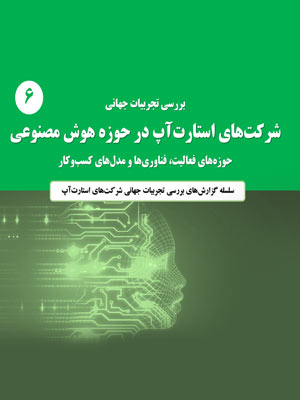


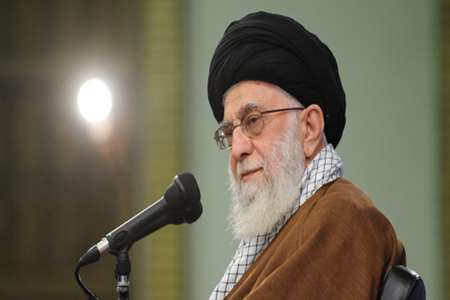
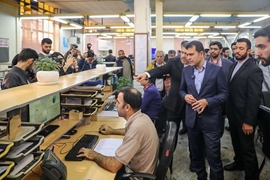
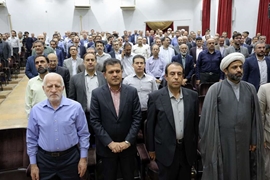
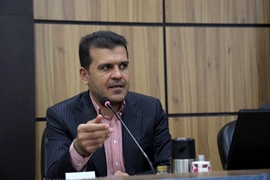
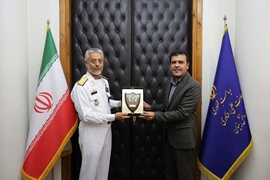

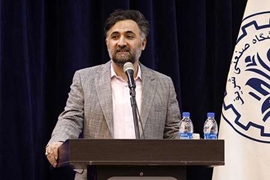
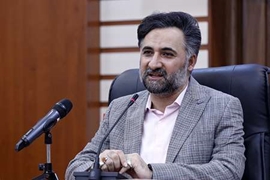
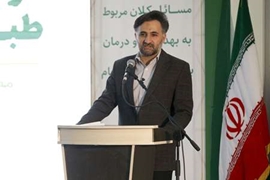
comment